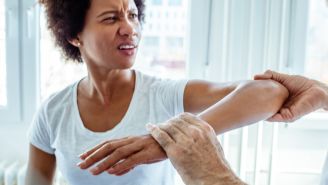Updated on April 29, 2024.
If you have psoriatic arthritis (PsA), you might worry that your swollen joints will never be pain-free again. But there’s good news: With the right treatment, many people with PsA can achieve remission.
What is remission?
Remission means the disease is controlled, says rheumatologist Paula Rackoff, MD, associate professor of clinical medicine at NYU Grossman School of Medicine. “Patients in remission have minimal joint pain and stiffness. They’re able to do all their daily activities with minimal symptoms and minimal morning stiffness,” she adds.
Since there is no cure for PsA, remission is the main goal of treatment. To achieve it, many people with PsA take powerful prescription medications. Some of the most commonly prescribed include:
- Conventional nonbiologic disease-modifying antirheumatic drugs (DMARDs)
- Biologic DMARDs
- Janus kinase (JAK) inhibitors
Not everyone who takes these drugs will reach remission—but many do, and the statistics are only improving. Once remission is achieved, Dr. Rackoff says that healthcare providers (HCPs) can often taper back and try to find “the least amount of medications that control the symptoms.”
How to improve your odds of remission
While remission cannot be guaranteed with treatment, there are a few ways you can help increase the chances.
See an HCP promptly if you notice symptoms. A quick and accurate diagnosis can make a big difference in the success of your PsA treatment. “People who are treated earlier on and more aggressively early on have more success with being on less medication later,” says Rackoff. “When people are first diagnosed, they’re hesitant to start medication,” she adds. Some people wait up to two years to start treatment.
About 30 percent of people with psoriasis, a skin condition, go on to develop PsA. If you have psoriasis, Rackoff says to watch for these three symptoms:
- Joint swelling along with joint pain
- More than 20 minutes of morning stiffness
- Joint pain and stiffness interferes with daily activities
Take medication as prescribed. A very small minority of people with PsA may be able to stop using medication entirely. Most others must take it continually to keep the condition at bay. Coming off medication prematurely often leads to symptom flare-ups and a return of disease activity.
It may be possible to use less medication as time goes on, however. “Many times we can minimize the amount of medication,” Rackoff says.
Eat a healthy overall diet. While the foods you eat won’t cure PsA, they may help lower inflammation and prevent weight gain, among other benefits. Try to:
- Limit your intake of red and processed meat, fried foods, fast food, and processed carbohydrates like white bread and pasta. These items are often high in saturated fat and/or added sugar and can aggravate PsA symptoms.
- Emphasize fruits, vegetables, whole grains, beans and legumes, nuts (especially walnuts) and seeds, olive oil, and fatty fish.
- Limit or stop using alcohol, since it has no health benefits and can interact with PsA medications.
Be active. Exercise has many potential advantages for people with PsA. It may help:
- Ease inflammation, pain, and fatigue
- Increase muscle strength
- Keep joints and tendons flexible
- Reduce disease activity
- Improve heart conditions that often accompany PsA
- Boost quality of life
“We always encourage people to exercise and strengthen the muscles around the joints that are affected,” says Rackoff. “The stronger the muscles are around a joint, the less the joint has to do.”
If you’re new to fitness, it’s okay to start small. Consider a few minutes of walking, swimming, yoga, or tai chi to begin. Any movement can help. Speak with an HCP to get recommendations for an activity that fits your health statues and lifestyle.
Maintain a healthy body weight. People with PsA are more likely to be obese than people without PsA. Obesity can increase wear and tear on joints and raise the risk of developing high blood pressure, high cholesterol, and heart disease. It may also reduce the effectiveness of some PsA medications, lowering the odds of remission.
If you are obese, losing even a small amount of weight can improve symptoms and the chances of remission. Adopting an overall healthy diet and getting regular physical activity help many people lose and/or maintain weight. Speak with an HCP about the approach that’s right for you.







